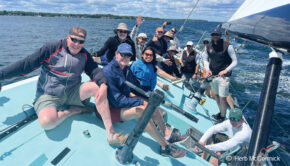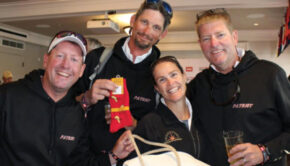How Football and Sailing have changed
Published on July 15th, 2014
It is increasing common for keelboat one design classes to offer a Corinthian Division, a classification that offers some safe haven for those owners from the heightening costs of competition. As the numbers of professional sailors increase in recreational events, the Corinthian awards offer recognition amid the bigger budgets.
Yachting historian John Rousmaniere reminds how the word ‘Corinthian’ has had a circuitous history.
“The first Corinthians were residents of the ancient Greek seaport of Corinth. A typical port town, Corinth was described by A. N. Wilson in his biography of St. Paul as ‘a place of proverbial wickedness, energy, riches, noise.’ The new alternate definition of ‘yachtsman’ as an amateur (Corinthian) was developed in Britain in the mid-nineteenth century and caught on in America.”
Among the influences in England for this new definition was the Corinthian Football Club, founded in 1882. Here is the history of the club from FIFA.com…
What made the Corinthian Football Club so extraordinary was not the success they enjoyed in football, but the way in which they played the game. For their founders and their players, amateur ideals, gentlemanly conduct and fair play were of far greater consequence than the result.
If, for example, their opponents lost a player to injury or dismissal, they would immediately and voluntarily remove one of their own men from the fray to retain a fair and level playing field. Notable too was their steadfast refusal to score from penalty kicks, which they would tap back to the opposition goalkeeper, content in the belief that no-one would ever attempt to gain an unfair advantage by deliberately fouling an opponent. Penalties, in Corinthians’ view, were ‘ungentlemanly’.
There was also no question of arguing with the referee at a club that stuck steadfastly to a strict moral code. One of its founders, NL ‘Pa’ Jackson, wrote in his autobiography that a footballer should be someone who “has learned to control his anger, to be considerate to his fellow men, to take no mean advantage, to resent as dishonour the very suspicion of trickery, and to bear aloft a cheerful countenance under disappointment.”
The club still exists today, though it is far less competitive. While it retains its amateur status, practices such as deliberately missing penalties and ‘sending off’ its own players have long since been abandoned.
On the heels of the FIFA World Cup, with the flopping and grabbing on display, it is notable how the sport has changed from the early years of the Corinthian Football Club. Might the same be said for sailing too?









 We’ll keep your information safe.
We’ll keep your information safe.